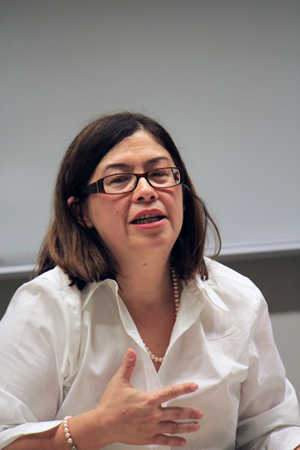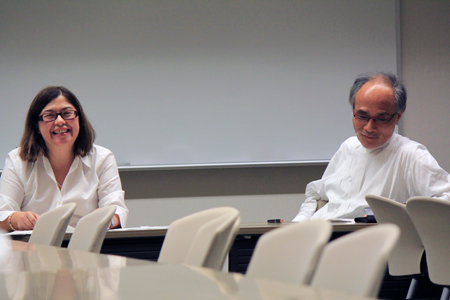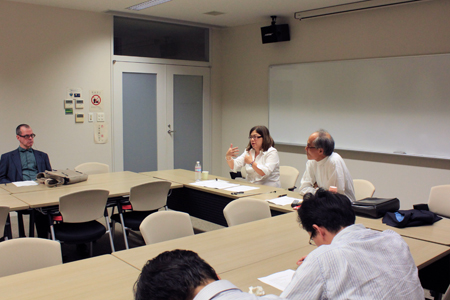[報告]Sandra Laugier "Attention to Ordinary Others"
On May 28th, 2012, Professor Sandra Laugier gave a presentation entitled "Attention to Ordinary Others: Ethics of 'Care,' Vulnerability, and Human Security". Professor Laugier teaches philosophy at L'Université de Paris I, Sorbonne, and has worked as the deputy director at the Institut des sciences humaines et sociales (INSHS).

In this presentation, Laugier's point of departure is that the notion of "care" offers us a way to re-think a number of contemporary ethical problems. Indeed, this notion makes it possible to conceive of a paradigm shift in the field of ethics. That is, a shift to an ethics of vulnerability, security, and citizenship. Laugier notes, first, that "care" is a tricky word, whose meaning is unusually fluid. Where le souci in French has a more narrow scope of meaning, the English word "care" encompasses an individual feeling, a disposition, as well as an activity ("caring for somebody").
To frame the problem of thinking about ethics in the contemporary world, and the need for a paradigm shift, Laugier takes up one of Wittgenstein's propositions: that all attempts to write or speak of ethical statements run up against the boundaries of language. For Wittgenstein, there is a certain pointlessness in these attempts, and they indicate that an Ethics cannot be a science, insofar as it cannot add to our knowledge. This proposition takes shape in a paradox of security. We find this in a statement such as: "I am safe, nothing can injure me whatever happens." In fact, it is impossible to orchestrate or guarantee this degree of absolute safety, and thus such statements have the quality of "nonsense".

As a way of thinking through this paradox, Laugier offers a reading of Joan Tronto's Moral Boundaires. The animating spirit here is not to speak of something invisible or conditions which are ultimately impossible to secure (e.g., "I am safe, nothing can injure me"), but rather to render visible (in the words of Michel Foucault) "what is so close, what is so immediate, what is tied so intimately to us that we do not perceive it." Care, then, is to be understood as this activity that encompasses all that we do to "maintain, continue, and repair our world so that we can live in it as well as possible." (Fisher and Tronto). By acknowledging the vulnerability and essential fragility of our condition, care takes on a different significance as a central human activity. This, in turn raises questions about the place of this activity in the present division of labor. What does it mean that the activity of care has been traditionally excluded from the public sphere and, by extension, from social and political theory? What can be said about the relationship between care, justice, and value? What is, then, the moral disposition of the activity of care?
Laugier argues that we consider the problems of moral and political judgment while taking into account concrete concerns about human security, and for these the notion of care provides a way to situate judgements in more local, quotidian experiences. Extending this idea, she proposes that we also consider Tronto's argument for care as a condition for citizenship. I.e., that the activity of citizens in a society may be determined by a relation of care with the nation and other citizens. In other words, it would be precisely through a recognition of this relationality that citizens are better able to address and ameliorate the insecurity and instability that threaten contemporary society.

After Professor Laugier's presentation, a spirited discussion followed with interventions by members of UTCP and questions from the audience. Professor Kobayashi suggested that part of the challenge of thinking through Wittgenstein's paradox of security using an ethics of care is that it seems to be a kind of "weak" notion. Care does not seem to have the absolute magnitude or clarity of a concept such as "justice", but it is perhaps precisely the malleability, expansiveness, and also concreteness of the notion of care that gives it a different power to think through an ethics of vulnerability, security, and citizenship.
— M. Downing Roberts






